强调句
英语语法大全:强调句
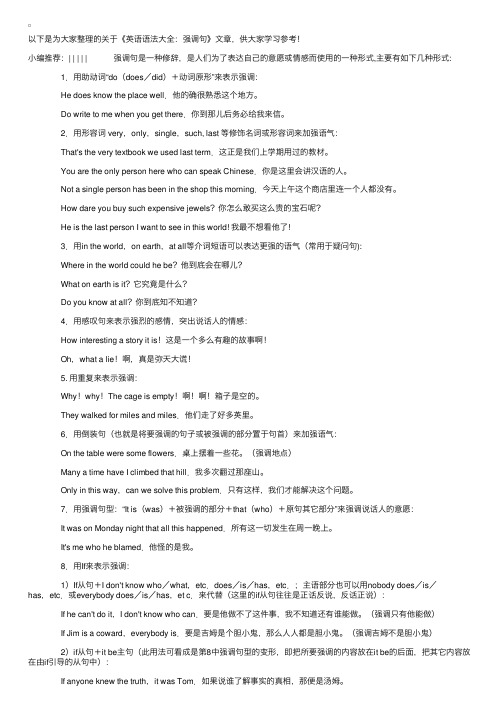
以下是为⼤家整理的关于《英语语法⼤全:强调句》⽂章,供⼤家学习参考!⼩编推荐:| | | | | 强调句是⼀种修辞,是⼈们为了表达⾃⼰的意愿或情感⽽使⽤的⼀种形式,主要有如下⼏种形式: 1.⽤助动词“do(does/did)+动词原形”来表⽰强调: He does know the place well.他的确很熟悉这个地⽅。
Do write to me when you get there.你到那⼉后务必给我来信。
2.⽤形容词 very,only,single,such, last 等修饰名词或形容词来加强语⽓: That's the very textbook we used last term.这正是我们上学期⽤过的教材。
You are the only person here who can speak Chinese.你是这⾥会讲汉语的⼈。
Not a single person has been in the shop this morning.今天上午这个商店⾥连⼀个⼈都没有。
How dare you buy such expensive jewels?你怎么敢买这么贵的宝⽯呢? He is the last person I want to see in this world! 我最不想看他了! 3.⽤in the world,on earth,at all等介词短语可以表达更强的语⽓(常⽤于疑问句): Where in the world could he be?他到底会在哪⼉? What on earth is it?它究竟是什么? Do you know at all?你到底知不知道? 4.⽤感叹句来表⽰强烈的感情,突出说话⼈的情感: How interesting a story it is!这是⼀个多么有趣的故事啊! Oh,what a lie!啊,真是弥天⼤谎! 5. ⽤重复来表⽰强调: Why!why!The cage is empty!啊!啊!箱⼦是空的。
英语强调句型
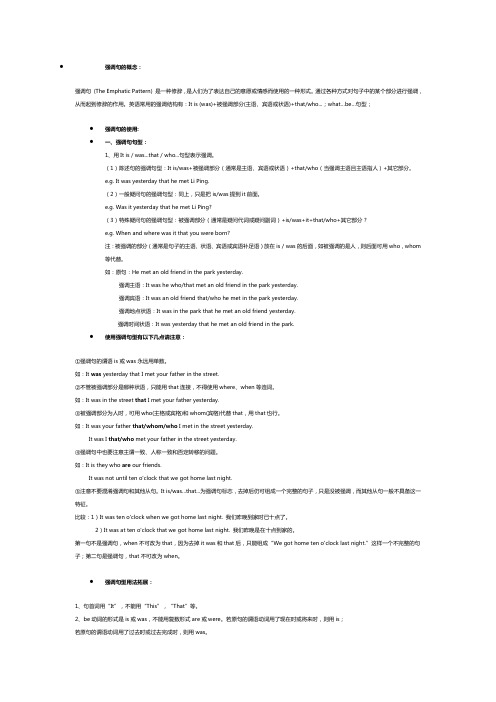
∙强调句的概念:强调句(The Emphatic Pattern) 是一种修辞,是人们为了表达自己的意愿或情感而使用的一种形式。
通过各种方式对句子中的某个部分进行强调,从而起到修辞的作用。
英语常用的强调结构有:It is (was)+被强调部分(主语、宾语或状语)+that/who...;what…be…句型;∙强调句的使用:∙一、强调句句型:1、用It is/was...that/who...句型表示强调。
(1)陈述句的强调句型:It is/was+被强调部分(通常是主语、宾语或状语)+that/who(当强调主语且主语指人)+其它部分。
e.g. It was yesterday that he met Li Ping.(2)一般疑问句的强调句型:同上,只是把is/was提到it前面。
e.g. Was it yesterday that he met Li Ping?(3)特殊疑问句的强调句型:被强调部分(通常是疑问代词或疑问副词)+is/was+it+that/who+其它部分?e.g. When and where was it that you were born?注:被强调的部分(通常是句子的主语、状语、宾语或宾语补足语)放在is/was的后面,如被强调的是人,则后面可用who,whom等代替。
如:原句:He met an old friend in the park yesterday.强调主语:It was he who/that met an old friend in the park yesterday.强调宾语:It was an old friend that/who he met in the park yesterday.强调地点状语:It was in the park that he met an old friend yesterday.强调时间状语:It was yesterday that he met an old friend in the park.∙使用强调句型有以下几点请注意:①强调句的谓语is或was永远用单数。
强调句句型

强调句句型研究必备欢迎下载一、强调句(一)强调句句型1、陈述句的强调句型:It is/ was +被强调部分(通常是主语、宾语或状语)+ that/ who(当强调主语且主语指人)+其它部分。
e.g. It was yesterday that he met Li Ping.2、一般疑问句的强调句型:同上,只是把is/ was提到it 前面。
e.g. Was it yesterday that he met Li Ping?3、特殊疑问句的强调句型:被强调部分(通常是疑问代词或疑问副词)+ is/ was + it + that/ who +其它部分?e.g. When and where was it that you were born?4、强调句例句:针对I met Li Ming at the railway station yesterday.句子进行强调。
强调主语:It was I that (who) met Li Ming at the railway station yesterday.强调宾语:It was Li Ming that I met at the railway station yesterday.夸大地址状语:It was at the railway station that I met Li Ming yesterday.夸大工夫状语:It was yesterday that I met Li Ming at the railway station.5、留意:组成夸大句的it自己没有词义;夸大句中的毗连词通俗只用that, who,纵然在夸大工夫状语和地址状语时也云云,that, who不成省略;夸大句中的时态只用两种,通俗现在时和通俗曩昔时。
原句谓语动词是通俗曩昔时、曩昔完成时和过去进行时,用It was …,其余的时态用It is …。
(二)not … until …句型的强调句1、句型为:It is/ was not until +被强调部分+ that +其它部分e.g.通俗句:He didn’t go to bed until/ till his wife came back.强调句:It was not until his wife came back that he went to bed.2、注意:此句型只用until,不用till。
强调句型

强调句型强调句中某一成分的句子叫做强调句。
强调句型主要有以下三种:1. It is (was)+被强调的部分+that 从句这是强调句型的常见结构。
被强调的部分通常为主语、宾语和状语。
翻译时被强调部分翻译成“是”、“正是”、“就是”等。
【It is professor Li that (who) sent me the letter .给我寄信的是李教授。
(主语)【It was Doctor James that (which) they talked about last week .她们上周讨论的就是这部小说。
(宾语)【It is only when one is ill that one knows the values of health.人们生病了才知道健康的价值。
(状语)2. 主语+do(does,did)+动词+其她部分如果句子没有助动词,在陈述句中的谓语动词前加do表示强调,通常用于一般过去四化中,也可用于祈使句中。
如:【You are quite wrong —she does like you .你大错特错——她的确喜欢你。
【In the past ,some people did think that the earth was square .从前,有些人的确认为地球是方的。
【Do send them electronic elements today .务必今天把这些电子器件送给她们。
3. What 引导的名词从句+is (was) +其她成分这一句型只要用来强调主语或宾语。
如:【What impressed me most was her image .给我印象最深的是她的形象。
【What I like is his writing style .我喜欢的是她的写作风格。
强调句的例句
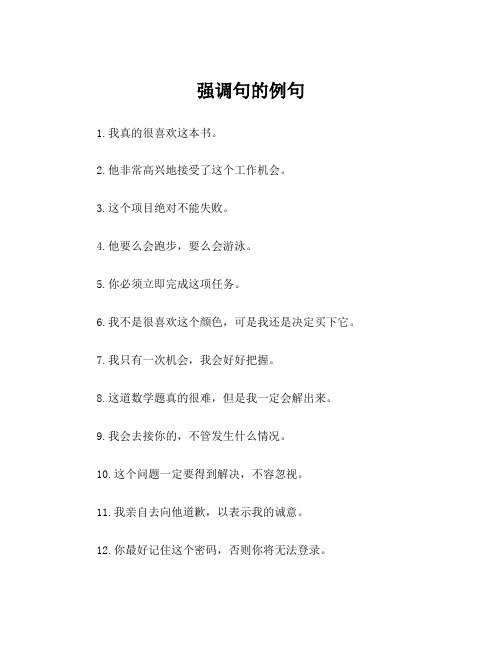
强调句的例句
1.我真的很喜欢这本书。
2.他非常高兴地接受了这个工作机会。
3.这个项目绝对不能失败。
4.他要么会跑步,要么会游泳。
5.你必须立即完成这项任务。
6.我不是很喜欢这个颜色,可是我还是决定买下它。
7.我只有一次机会,我会好好把握。
8.这道数学题真的很难,但是我一定会解出来。
9.我会去接你的,不管发生什么情况。
10.这个问题一定要得到解决,不容忽视。
11.我亲自去向他道歉,以表示我的诚意。
12.你最好记住这个密码,否则你将无法登录。
13.那个演员实在太优秀了,他一直得到大家的赞美。
14.这个机会不容错过,你应该抓住。
15.他拒绝了所有的帮助,坚持自己解决问题。
16.我为自己的所作所为感到非常后悔。
17.这个问题的解决办法只有一个,你需要了解清楚。
18.我绝对不能让他再次受到伤害。
19.这次考试决定了我的未来,我会全力以赴。
20.明天一早,我一定会准时到达机场。
21.他是一个非常聪明的孩子,经常获得好成绩。
强调句的构成和语法特点

强调句的构成和语法特点在语法学中,强调句是一种通过特定的语法结构和词汇,用来强调某种信息或者让某个词或短语显得更重要的句子形式。
通过适当的强调,可以使句子更加生动有力,突出重点,增强语言表达的效果。
本文将介绍强调句的构成和语法特点,并通过举例说明其用法。
一、强调句的构成通常情况下,强调句由以下两个基本成分构成:助动词do(包括其各种形式)以及so, such, very, too, quite等副词。
例如:1. It was he who broke the vase.2. I do like ice cream.3. She is such a talented musician.4. He is too tired to go out tonight.5. The cake is very delicious.二、强调句的语法特点强调句在语法上具有以下几个特点:1. 词序倒装在强调句中,为了突出强调的内容,通常会将句子中的主语和谓语动词的语序颠倒。
例如:1. It was he who broke the vase.(强调“他”打破了花瓶)2. Do I love you? Yes, I do.(强调“我”确实爱你)3. Such a talented musician she is.(强调“她”是一个多么有才华的音乐家)2. 使用特殊的副词或词组为了强调某个词或短语,可以使用特殊的副词或词组,如so, such, very, too, quite等。
例如:1. I do like ice cream.(强调“我”确实喜欢冰淇淋)2. She is such a talented musician.(强调“她”是一个多么有才华的音乐家)3. He is too tired to go out tonight.(强调“他”太累了,不能出去)3. 强调句仍保留陈述句的基本结构尽管强调句在语法上有一些特殊的构成要求,但其基本的句子结构仍然保持陈述句的形式。
强调句句型
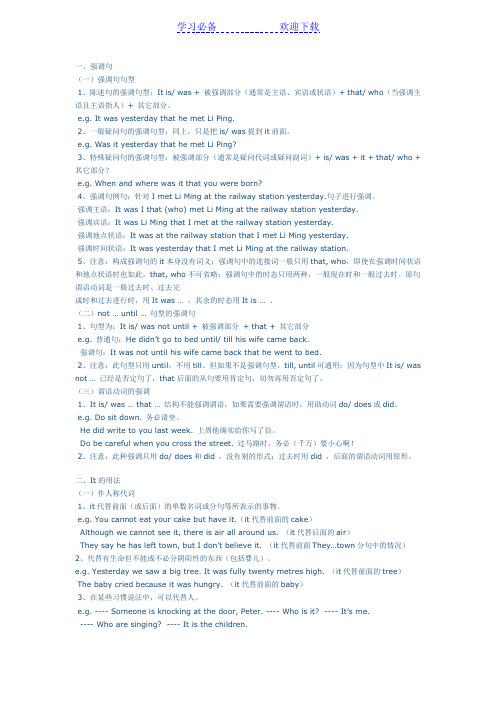
一、强调句(一)强调句句型1、陈述句的强调句型:It is/ was + 被强调部分(通常是主语、宾语或状语)+ that/ who(当强调主语且主语指人)+ 其它部分。
e.g. It was yesterday that he met Li Ping.2、一般疑问句的强调句型:同上,只是把is/ was提到it前面。
e.g. Was it yesterday that he met Li Ping?3、特殊疑问句的强调句型:被强调部分(通常是疑问代词或疑问副词)+ is/ was + it + that/ who + 其它部分?e.g. When and where was it that you were born?4、强调句例句:针对I met Li Ming at the railway station yesterday.句子进行强调。
强调主语:It was I that (who) met Li Ming at the railway station yesterday.强调宾语:It was Li Ming that I met at the railway station yesterday.强调地点状语:It was at the railway station that I met Li Ming yesterday.强调时间状语:It was yesterday that I met Li Ming at the railway station.5、注意:构成强调句的it本身没有词义;强调句中的连接词一般只用that, who,即使在强调时间状语和地点状语时也如此,that, who不可省略;强调句中的时态只用两种,一般现在时和一般过去时。
原句谓语动词是一般过去时、过去完成时和过去进行时,用It was … ,其余的时态用It is … 。
(二)not … until … 句型的强调句1、句型为:It is/ was not until + 被强调部分+ that + 其它部分e.g. 普通句:He didn’t go to bed until/ till his wife came back.强调句:It was not until his wife came back that he went to bed.2、注意:此句型只用until,不用till。
英语语法之强调句

用ever,never,very,just等副词进行强 调: 1. Why ever did you do so? 你究竟为什么要 这么做? 2. He never said a word the whole day. 一整天,他一句话也没说。 3. You’ve got to be very,very careful.你一定得非常、非常小心。 4. This is just what I wanted.这正是我所 要的。
注意:
强调句型的时态要以原句的时态为 依据。原句用现在时,强调句用is;若 原句为过去时,强调句中则要用was。 例如: I met him in the street yesterday. (原句) →It was him that I met in the street yesterday.
4.
用感叹句来表示强烈的感情,突出说 话人的情感: How interesting a story it is!这是 一个多么有趣的故事啊! Oh, what a lie!啊,真是弥天大谎!
5.
用倒装句(也就是将要强调的句子或被 强调的部分置于句首)来加强语气: On the table were some flowers.桌上 摆着一些花。(强调地点) Many a time have I climbed that hill.我 多次翻过那座山。 Only in this way,can we solve this problem.只有这样,我们才能解决这个 问题。
她就是擅长唱歌的女孩。 It is the girl who is good at singing. 4. 那就是他叔叔移居纽约的原因。 It was for this reason that his uncle moved to New York. 5. 错的人是我。 It is I who am wrong.
英语十大强调句
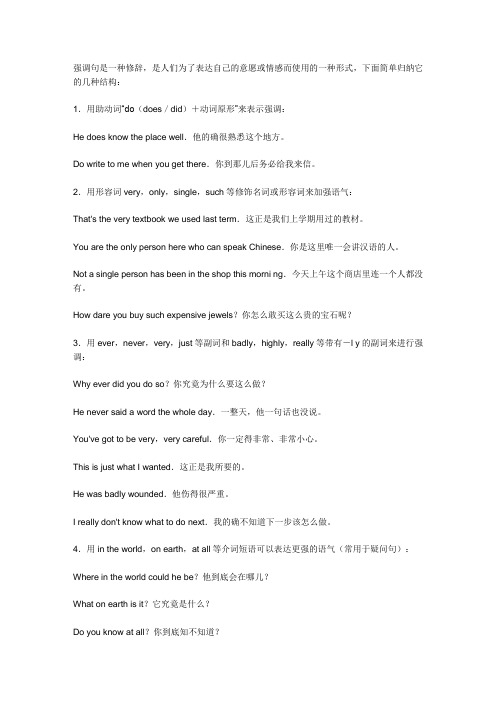
强调句是一种修辞,是人们为了表达自己的意愿或情感而使用的一种形式,下面简单归纳它的几种结构:1.用助动词“do(does/did)+动词原形”来表示强调:He does know the place well.他的确很熟悉这个地方。
Do write to me when you get there.你到那儿后务必给我来信。
2.用形容词very,only,single,such等修饰名词或形容词来加强语气:That's the very textbook we used last term.这正是我们上学期用过的教材。
You are the only person here who can speak Chinese.你是这里唯一会讲汉语的人。
Not a single person has been in the shop this morni ng.今天上午这个商店里连一个人都没有。
How dare you buy such expensive jewels?你怎么敢买这么贵的宝石呢?3.用ever,never,very,just等副词和badly,highly,really等带有-l y的副词来进行强调:Why ever did you do so?你究竟为什么要这么做?He never said a word the whole day.一整天,他一句话也没说。
You've got to be very,very careful.你一定得非常、非常小心。
This is just what I wanted.这正是我所要的。
He was badly wounded.他伤得很严重。
I really don't know what to do next.我的确不知道下一步该怎么做。
4.用in the world,on earth,at all等介词短语可以表达更强的语气(常用于疑问句):Where in the world could he be?他到底会在哪儿?What on earth is it?它究竟是什么?Do you know at all?你到底知不知道?5.用感叹句来表示强烈的感情,突出说话人的情感:How interesting a story it is!这是一个多么有趣的故事啊!Oh,what a lie!啊,真是弥天大谎!6.用重复来表示强调:Why!why!The cage is empty!啊!啊!箱子是空的。
语法之强调句型大总结
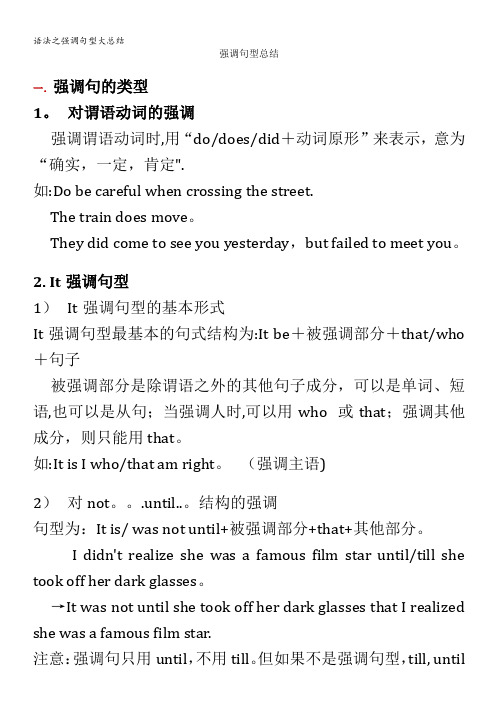
强调句型总结一.强调句的类型1。
对谓语动词的强调强调谓语动词时,用“do/does/did+动词原形”来表示,意为“确实,一定,肯定".如:Do be careful when crossing the street.The train does move。
They did come to see you yesterday,but failed to meet you。
2. It强调句型1)It强调句型的基本形式It强调句型最基本的句式结构为:It be+被强调部分+that/who +句子被强调部分是除谓语之外的其他句子成分,可以是单词、短语,也可以是从句;当强调人时,可以用who 或that;强调其他成分,则只能用that。
如:It is I who/that am right。
(强调主语)2)对not。
.until..。
结构的强调句型为:It is/ was not until+被强调部分+that+其他部分。
I didn't realize she was a famous film star until/till she took off her dark glasses。
→It was not until she took off her dark glasses that I realized she was a famous film star.注意:强调句只用until,不用till。
但如果不是强调句型,till, until可通用;因为句型中It is / was not .。
. 已经是否定句了,that后面的从句要用肯定句,切勿再用否定句了。
3. 强调句的一般疑问句和特殊疑问句(1) 强调句的一般疑问句的基本句型为:Be+it+被强调部分+that/who+句子其他成分如:Is it Professor Wang who teaches you English?(2)强调句的特殊疑问句的基本句型为:特殊疑问词+be+it+that/who/whom+句子其他成分如:What is it that you want me to do?注意:强调句的特殊疑问句用于名词性从句中,要用陈述语序。
强调句用法全归纳
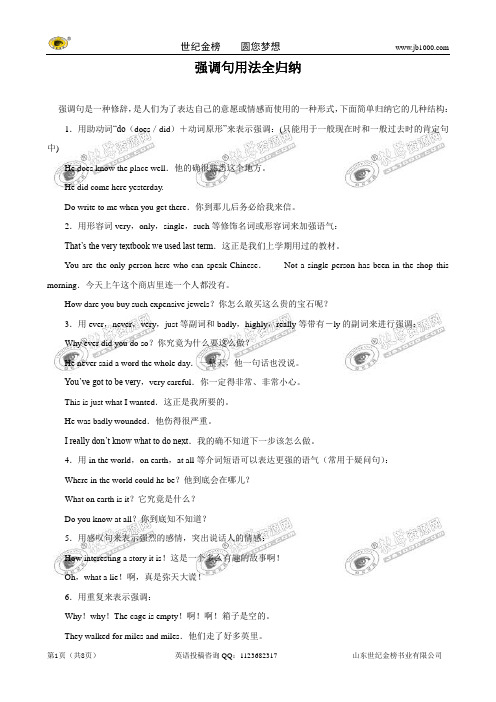
强调句用法全归纳强调句是一种修辞,是人们为了表达自己的意愿或情感而使用的一种形式,下面简单归纳它的几种结构:1.用助动词“do(does/did)+动词原形”来表示强调:(只能用于一般现在时和一般过去时的肯定句中)He does know the place well.他的确很熟悉这个地方。
He did come here yesterday.Do write to me when you get there.你到那儿后务必给我来信。
2.用形容词very,only,single,such等修饰名词或形容词来加强语气:That’s the very textbook we used last term.这正是我们上学期用过的教材。
You are the only person here who can speak Chinese.Not a single person has been in the shop this morning.今天上午这个商店里连一个人都没有。
How dare you buy such expensive jewels?你怎么敢买这么贵的宝石呢?3.用ever,never,very,just等副词和badly,highly,really等带有-ly的副词来进行强调:Why ever did you do so?你究竟为什么要这么做?He never said a word the whole day.一整天,他一句话也没说。
You’ve got to be very,very careful.你一定得非常、非常小心。
This is just what I wanted.这正是我所要的。
He was badly wounded.他伤得很严重。
I really don’t know what to do next.我的确不知道下一步该怎么做。
4.用in the world,on earth,at all等介词短语可以表达更强的语气(常用于疑问句):Where in the world could he be?他到底会在哪儿?What on earth is it?它究竟是什么?Do you know at all?你到底知不知道?5.用感叹句来表示强烈的感情,突出说话人的情感:How interesting a story it is!这是一个多么有趣的故事啊!Oh,what a lie!啊,真是弥天大谎!6.用重复来表示强调:Why!why!The cage is empty!啊!啊!箱子是空的。
强调句的构成和示例
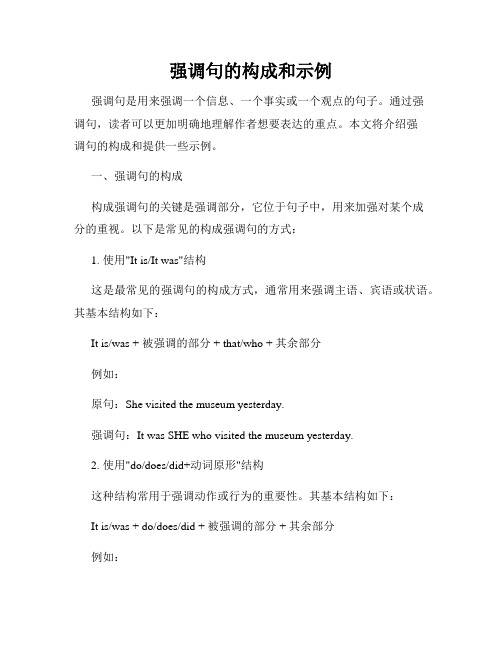
强调句的构成和示例强调句是用来强调一个信息、一个事实或一个观点的句子。
通过强调句,读者可以更加明确地理解作者想要表达的重点。
本文将介绍强调句的构成和提供一些示例。
一、强调句的构成构成强调句的关键是强调部分,它位于句子中,用来加强对某个成分的重视。
以下是常见的构成强调句的方式:1. 使用"It is/It was"结构这是最常见的强调句的构成方式,通常用来强调主语、宾语或状语。
其基本结构如下:It is/was + 被强调的部分 + that/who + 其余部分例如:原句:She visited the museum yesterday.强调句:It was SHE who visited the museum yesterday.2. 使用"do/does/did+动词原形"结构这种结构常用于强调动作或行为的重要性。
其基本结构如下:It is/was + do/does/did + 被强调的部分 + 其余部分例如:原句:He eats breakfast every day.强调句:It is HE who EATS breakfast every day.3. 使用“最高级形式”结构当我们想要强调某个成分是某个属性的"最高级形式"时,可以使用这种结构。
其基本结构如下:It is/was + the + 最高级形式 + 被强调的部分 + 其余部分例如:原句:London is a big city.强调句:It is IN LONDON that you can find the BIGGEST city in the UK.二、强调句的示例以下是一些常见场景中使用强调句的示例:1. 强调主语:- It is JOHN who won the singing competition.- It was I who broke the window.2. 强调宾语:- It is a DOG that bit me.- It was the CAT that knocked over the vase.3. 强调状语:- It was in PARIS that I had my first solo exhibition.- It is on FRIDAY that we usually have our team meetings.4. 强调动作或行为:- It is she who SAVED my life.- It was he who STOLE my wallet.5. 强调最高级形式:- It is the TALLEST building in the world.- It was the BEST movie I have ever seen.三、总结强调句是一种有效的语法结构,用来突出一个句子中的重点内容。
高中英语语法基础 强调句型知识点总结归纳讲解(附同步练习)(有答案)
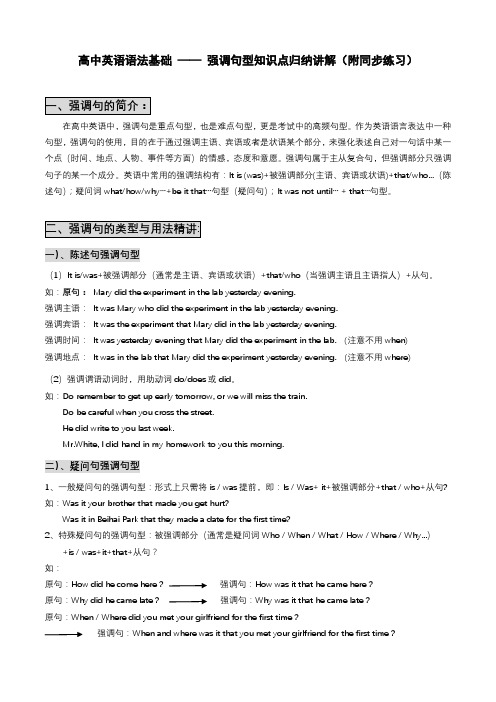
高中英语语法基础——强调句型知识点归纳讲解(附同步练习)在高中英语中,强调句是重点句型,也是难点句型,更是考试中的高频句型。
作为英语语言表达中一种句型,强调句的使用,目的在于通过强调主语、宾语或者是状语某个部分,来强化表述自己对一句话中某一个点(时间、地点、人物、事件等方面)的情感,态度和意愿。
强调句属于主从复合句,但强调部分只强调句子的某一个成分。
英语中常用的强调结构有:It is (was)+被强调部分(主语、宾语或状语)+that/who...(陈述句);疑问词what/how/why…+be it that…句型(疑问句);It was not until… + that…句型。
一)、陈述句强调句型(1)It is/was+被强调部分(通常是主语、宾语或状语)+that/who(当强调主语且主语指人)+从句。
如:原句:Mary did the experiment in the lab yesterday evening.强调主语:It was Mary who did the experiment in the lab yesterday evening.强调宾语:It was the experiment that Mary did in the lab yesterday evening.强调时间:It was yesterday evening that Mary did the experiment in the lab. (注意不用when)强调地点:It was in the lab that Mary did the experiment yesterday evening. (注意不用where)(2)强调谓语动词时,用助动词do/does或did。
如:Do remember to get up early tomorrow, or we will miss the train.Do be careful when you cross the street.He did write to you last week.Mr.White, I did hand in my homework to you this morning.二)、疑问句强调句型1、一般疑问句的强调句型:形式上只需将is / was提前,即:Is / Was+ it+被强调部分+that / who+从句? 如:Was it your brother that made you get hurt?Was it in Beihai Park that they made a date for the first time?2、特殊疑问句的强调句型:被强调部分(通常是疑问词Who / When / What / How / Where / Why...)+is / was+it+that+从句?如:原句:How did he come here ? 强调句:How was it that he came here ?原句:Why did he came late ? 强调句:Why was it that he came late ?原句:When / Where did you met your girlfriend for the first time ?强调句:When and where was it that you met your girlfriend for the first time ?三)、not...until...强调句型1、句型为:It is/was not until+被强调部分+that+从句。
高考英语语法——强调句(共12张PPT)

强调句用于感叹句中
What a silly mistake it is that you have made!
12
10
被强调的名词或代词可带有一个定语从句
Was it Bill, who plays football well, that helped the blind man cross the road? It was in the school, where I once studied, that we hold a party. Was it in the house, which we visited last year, that the murder happened?
时间状语从句、原因状语从句
4
Was it they that (who) would get married? It was not they that (who) would get married.
5
What was it that I had done? Who was it that did it? When is it that the train will draw out of the station? How is it that you find the key? Why was it that you talk back to your parents?
2
3
主语 宾语 宾补 状语
It is what you said that makes her angry. It was our English teacher whom we invited to take part in our party. It is yellow that the workers paint the wall. It was because it rained heavily that we couldn't hold the sports meet.
强调句典型例句100句
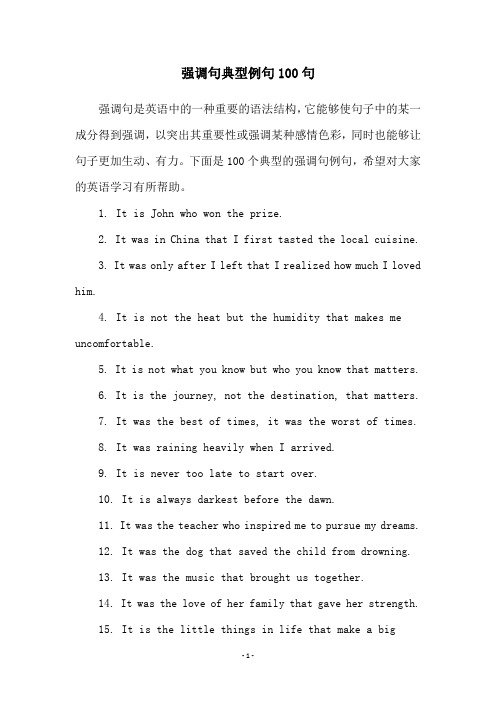
强调句典型例句100句强调句是英语中的一种重要的语法结构,它能够使句子中的某一成分得到强调,以突出其重要性或强调某种感情色彩,同时也能够让句子更加生动、有力。
下面是100个典型的强调句例句,希望对大家的英语学习有所帮助。
1. It is John who won the prize.2. It was in China that I first tasted the local cuisine.3. It was only after I left that I realized how much I loved him.4. It is not the heat but the humidity that makes me uncomfortable.5. It is not what you know but who you know that matters.6. It is the journey, not the destination, that matters.7. It was the best of times, it was the worst of times.8. It was raining heavily when I arrived.9. It is never too late to start over.10. It is always darkest before the dawn.11. It was the teacher who inspired me to pursue my dreams.12. It was the dog that saved the child from drowning.13. It was the music that brought us together.14. It was the love of her family that gave her strength.15. It is the little things in life that make a bigdifference.16. It is the thought that counts.17. It was the kindness of strangers that helped me througha difficult time.18. It was the beauty of the sunset that took my breath away.19. It was the silence that spoke volumes.20. It was the courage of the firefighters that saved the building from burning down.21. It is the people, not the place, that make a home.22. It is the memories that we cherish most.23. It was the laughter that echoed through the room.24. It was the tears that flowed freely.25. It is the truth that will set you free.26. It is the lie that will come back to haunt you.27. It was the fear that paralyzed me.28. It was the anger that consumed me.29. It is the happiness that we all strive for.30. It is the sadness that we all try to avoid.31. It is the fear of the unknown that holds us back.32. It was the excitement that filled the air.33. It was the disappointment that hung heavy in the room.34. It is the hope that keeps us going.35. It is the despair that can bring us down.36. It was the confidence that led to his success.37. It was the doubt that held him back.38. It is the love that makes life worth living.39. It is the hate that can tear us apart.40. It was the joy that filled her heart.41. It was the sorrow that weighed her down.42. It is the courage to take risks that leads to great rewards.43. It is the fear of failure that holds us back.44. It was the determination that led to his victory.45. It was the lack of motivation that led to his defeat.46. It is the perseverance that leads to success.47. It is the giving up that leads to failure.48. It is the hard work that leads to achievement.49. It is the laziness that leads to mediocrity.50. It was the confidence that made her shine.51. It was the shyness that made her fade into the background.52. It is the intelligence that leads to success.53. It is the ignorance that leads to failure.54. It was the honesty that earned him respect.55. It was the dishonesty that earned him scorn.56. It is the loyalty that builds strong relationships.57. It is the betrayal that tears them apart.58. It was the generosity that made her beloved.59. It was the selfishness that made her despised.60. It is the forgiveness that heals wounds.61. It is the grudge that festers and grows.62. It was the respect that he showed that earned him admiration.63. It was the disrespect that he showed that earned him contempt.64. It is the humility that makes us human.65. It is the arrogance that makes us insufferable.66. It was the gratitude that she expressed that touched their hearts.67. It was the ingratitude that she showed that turned them away.68. It is the patience that leads to understanding.69. It is the impatience that leads to frustration.70. It was the understanding that led to reconciliation.71. It was the misunderstanding that led to conflict.72. It is the communication that leads to resolution.73. It is the lack of communication that leads to misunderstanding.74. It was the teamwork that led to success.75. It was the individualism that led to failure.76. It is the cooperation that leads to progress.77. It is the competition that leads to stagnation.78. It was the harmony that made them a great team.79. It was the discord that tore them apart.80. It is the balance that leads to a healthy life.81. It is the imbalance that leads to an unhealthy life.82. It was the moderation that led to his longevity.83. It was the excess that led to his downfall.84. It is the simplicity that leads to happiness.85. It is the complexity that leads to stress.86. It was the beauty of the natural world that inspired him.87. It was the ugliness of the city that depressed him.88. It is the peace of the countryside that soothes the soul.89. It is the chaos of the city that frazzles the nerves.90. It was the serenity of the ocean that calmed her.91. It was the turbulence of the storm that frightened her.92. It is the freedom of expression that is a fundamental human right.93. It is the censorship of expression that is a violation of human rights.94. It was the diversity of cultures that enriched his life.95. It was the homogeneity of cultures that bored him.96. It is the tolerance of differences that leads to harmony.97. It is the intolerance of differences that leads to conflict.98. It was the acceptance of change that led to progress.99. It was the resistance to change that led to stagnation. 100. It is the adaptability that leads to survival.以上是100个典型的强调句例句,通过这些例句的学习,我们可以更好地理解强调句的语法结构和用法,同时也能够提高自己的英语表达能力。
强调句典型例句100句

强调句典型例句100句强调句是英语中非常重要的语法结构之一,它可以用来强调某个句子成分的重要性或者突出某个观点的重要性。
在英语中,强调句常常使用倒装句和强调副词来表达。
下面是100个典型的强调句例句,希望对大家的英语学习有所帮助。
1. It was John who stole the money.(强调主语)2. It is the teacher who makes the difference in education.(强调主语)3. It was in Paris where I met my wife.(强调地点状语)4. It is only after we have lost everything that we are free to do anything.(强调时间状语)5. It was not until I met him that I realized how muchI loved him.(强调时间状语)6. It was in the library that I found the book.(强调地点状语)7. It was on the top of the mountain that we saw the sunrise.(强调地点状语)8. It was not until I got home that I realized I had left my keys in the office.(强调时间状语)9. It was only when I saw the movie that I understood the book.(强调时间状语)10. It is the little things that count.(强调宾语)11. It is the people who make the difference.(强调主语)12. It was the best party I have ever been to.(强调宾语)13. It is not what you say, but how you say it.(强调宾语)14. It is not what you know, but who you know.(强调宾语)15. It was not the answer I was looking for.(强调宾语)16. It was the worst day of my life.(强调宾语)17. It is not until you lose everything that yourealize what you had.(强调宾语)18. It is only when you are alone that you can truly be yourself.(强调宾语)19. It is not how much you have, but how much you enjoy that makes you happy.(强调宾语)20. It was the most beautiful sunset I have ever seen.(强调宾语)21. It is not what you do, but how you do it that matters.(强调宾语)22. It was the most delicious meal I have ever had.(强调宾语)23. It is not what you wear, but how you wear it that makes you stylish.(强调宾语)24. It was the most exciting game I have ever watched.(强调宾语)25. It is not where you go, but who you go with that makes the trip memorable.(强调宾语)26. It was the scariest movie I have ever seen.(强调宾语)27. It is not what you have, but what you give that defines you.(强调宾语)28. It was the longest journey I have ever taken.(强调宾语)29. It is not what you achieve, but how you achieve it that matters.(强调宾语)30. It was the most challenging project I have ever worked on.(强调宾语)31. It is not what you say, but what you do that counts.(强调宾语)32. It was the most difficult decision I have ever made.(强调宾语)33. It is not what you have, but what you do with whatyou have that matters.(强调宾语)34. It was the most important lesson I have ever learned.(强调宾语)35. It is not what you have, but who you are that matters.(强调宾语)36. It was the most inspiring speech I have ever heard.(强调宾语)37. It is not what you take, but what you leave behind that counts.(强调宾语)38. It was the most memorable vacation I have ever had.(强调宾语)39. It is not what you gain, but what you give up that defines you.(强调宾语)40. It was the most romantic evening I have ever had.(强调宾语)41. It is not what you earn, but how you earn it that matters.(强调宾语)42. It was the most satisfying meal I have ever had.(强调宾语)43. It is not what you receive, but what you give that makes you rich.(强调宾语)44. It was the most touching story I have ever heard.(强调宾语)45. It is not what you have, but what you do that defines you.(强调宾语)46. It was the most wonderful experience I have ever had.(强调宾语)47. It is not what you get, but what you give that matters.(强调宾语)48. It was the most amazing sight I have ever seen.(强调宾语)49. It is not what you have, but what you share that makes you happy.(强调宾语)50. It was the most beautiful wedding I have ever attended.(强调宾语)51. It is not what you believe, but how you act on your beliefs that matters.(强调宾语)52. It was the most breathtaking view I have ever seen.(强调宾语)53. It is not what you have, but what you do with what you have that counts.(强调宾语)54. It was the most challenging obstacle I have ever faced.(强调宾语)55. It is not what you know, but how you apply what youknow that matters.(强调宾语)56. It was the most difficult test I have ever taken.(强调宾语)57. It is not what you say, but how you say it that matters.(强调宾语)58. It was the most exciting adventure I have ever had.(强调宾语)59. It is not what you have, but who you are that counts.(强调宾语)60. It was the most important decision I have ever made.(强调宾语)61. It is not what you do, but why you do it that matters.(强调宾语)62. It was the most memorable moment I have ever experienced.(强调宾语)63. It is not what you have, but what you give that makes you rich.(强调宾语)64. It was the most rewarding experience I have ever had.(强调宾语)65. It is not what you say, but what you do that defines you.(强调宾语)66. It was the most satisfying job I have ever had.(强调宾语)67. It is not what you have, but what you do with it that counts.(强调宾语)68. It was the most surprising news I have ever heard.(强调宾语)69. It is not what you have, but what you do that makes you happy.(强调宾语)70. It was the most unusual experience I have ever had.(强调宾语)71. It is not what you have, but what you do that matters.(强调宾语)72. It was the most wonderful feeling I have ever experienced.(强调宾语)73. It is not what you have, but what you do with what you have that counts.(强调宾语)74. It was the most beautiful painting I have ever seen.(强调宾语)75. It is not what you have, but what you do that defines you.(强调宾语)76. It was the most challenging task I have ever undertaken.(强调宾语)77. It is not what you have, but what you do that makesa difference.(强调宾语)78. It was the most exciting event I have ever attended.(强调宾语)79. It is not what you have, but what you do that makes you successful.(强调宾语)80. It was the most important experience I have ever had.(强调宾语)81. It is not what you have, but what you do that makes you great.(强调宾语)82. It was the most meaningful conversation I have ever had.(强调宾语)83. It is not what you have, but what you give that makes you valuable.(强调宾语)84. It was the most powerful speech I have ever heard.(强调宾语)85. It is not what you have, but what you do that makes you extraordinary.(强调宾语)86. It was the most satisfying experience I have ever had.(强调宾语)87. It is not what you have, but what you do that makes you special.(强调宾语)88. It was the most significant event I have ever beena part of.(强调宾语)89. It is not what you have, but what you do that makes you unique.(强调宾语)90. It was the most valuable lesson I have ever learned.(强调宾语)91. It is not what you have, but what you do that makes you important.(强调宾语)92. It was the most challenging experience I have ever had.(强调宾语)93. It is not what you have, but what you do that makes you admirable.(强调宾语)94. It was the most enriching experience I have ever had.(强调宾语)95. It is not what you have, but what you do that makes you successful.(强调宾语)96. It was the most fulfilling experience I have ever had.(强调宾语)97. It is not what you have, but what you do that makes you happy.(强调宾语)98. It was the most life-changing experience I have ever had.(强调宾语)99. It is not what you have, but what you do that makesyou fulfilled.(强调宾语)100. It was the most transformational experience I have ever had.(强调宾语)总之,强调句在英语中是一种非常重要的语法结构,可以用来强调句子成分的重要性或者突出某个观点的重要性。
强调句

强调句结构1.用It is/was…that/who…句型表示强调。
被强调的部分(通常是句子的主语、状语、宾语或宾语补足语)放在is/was的后面,如被强调的是人,则后面可用who,whom等代替。
例如:He met an old friend in the park yesterday.他昨天在公园碰见一个老朋友。
上述句子可以通过强调句型对除谓语以外的不同成分进行强调。
如:It was he who/that met an old friend in the park yesterday.(强调主语)It was an old friend that/who he met in the park yesterday.(强调宾语)It was in the park that he met an old friend yesterday.(强调地点状语)It was yesterday that he met an old friend in he park.(强调时间状语)2. 用助动词do, does或did来强调谓语动词。
例如:Do come early. 一定早点来。
He did send you a letter last week. 他上周确实给你寄过一封信。
We’re pleased that she does intend to come. 她的确打算来,我们非常高兴。
3.为了加强语气,我们可以将not until用在It be …that ,…”强调句型中,组成“It is /was not until…that…”结构,not 的否定功能仍不变,用来否定后面的谓语动词。
(1)It was not until she took off her dark glasses that I realized she was a famous film star.(2)It was not until 1920 that regular radio broadcasts beganI.单项选择从A、B、C、D四个选项中,选出可以填入空白处的最佳答案:1. It _____ Mike and Mary who helped the old man several days ago .A. wasB. areC. wereD. had been2. It was not until yesterday _____ he joined the army.A. whichB. whenC. thatD. since3. She said she would go and she ________ go.A. didn'tB. didC. reallyD. would4. It was the training _____ he had as a young man _____ made him sucha good engineer.A. what; thatB. that; whatC. that; whichD. which; that5. --- Were all three people in the car injured in the accident?--- No, ______ only the two passengers who got hurt.A. there wereB. it wereC. there wasD. it was。
强调句
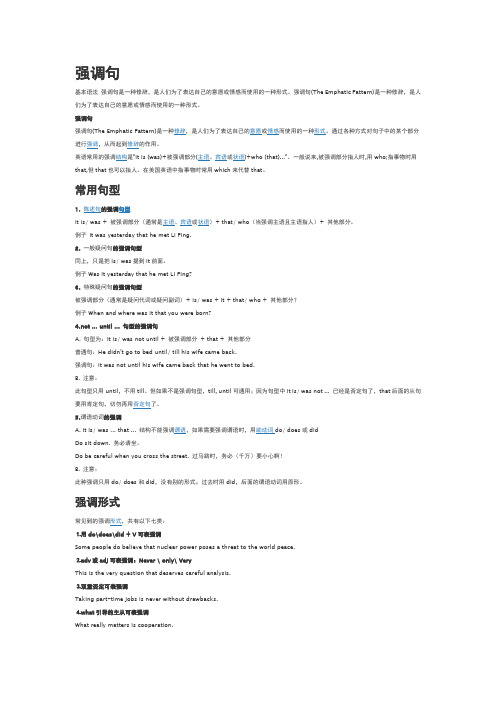
强调句基本语法强调句是一种修辞,是人们为了表达自己的意愿或情感而使用的一种形式。
强调句(The Emphatic Pattern)是一种修辞,是人们为了表达自己的意愿或情感而使用的一种形式。
强调句强调句(The Emphatic Patter n)是一种修辞,是人们为了表达自己的意愿或情感而使用的一种形式。
通过各种方式对句子中的某个部分进行强调,从而起到修辞的作用。
英语常用的强调结构是"It is (was)+被强调部分(主语、宾语或状语)+who (that)..."。
一般说来,被强调部分指人时,用who;指事物时用that,但that也可以指人。
在美国英语中指事物时常用which来代替that。
常用句型1. 陈述句的强调句型It is/ was + 被强调部分(通常是主语、宾语或状语)+ that/ who(当强调主语且主语指人)+ 其他部分。
例子It was yester day that he met Li Ping.2. 一般疑问句的强调句型同上,只是把is/ was提到it前面。
例子 Was it yester day that he met Li Ping?3. 特殊疑问句的强调句型被强调部分(通常是疑问代词或疑问副词)+ is/ was + it + that/ who + 其他部分?例子 When and wher e was it that you wer e born?4.not … until … 句型的强调句A. 句型为:It is/ was not until + 被强调部分+ that + 其他部分普通句:He didn't go to bed until/ till his wife came back.强调句:It was not until his wife came back that he went to bed.B. 注意:此句型只用until,不用till。
英语中的强调句详解

强调句详解强调句是对句中的某个部分进行强调,从而达到修辞的作用。
强调句的结构为:1.It is/was+被强调部分+that/who...当被强调部分为指人的词且在句中作主语时,可用who也可用that。
原句是一般现在时或一般将来时,it后用 is;原句是过去时,it后用 was;It后决不会出现are或were。
It is our parents that/who help us without expecting anyting in return.(强调主语 our parents)Our parents help us without expecting anyting in return.It was a baby that he saw on the street.He saw a baby on the street.强调句中句子成分的形式应与原句保持一致。
that可省略。
It was then (that) I made her acquaintance.I made her acquaintance then.It is Jim (that/who) always speaks English.It was in this village (that) I lived 3 years ago.把 It is/was...that 去掉后,还能拼成一完整的句子。
2.用do,did,does进行强调谓语,适用于一般现在时或一般过去时的肯定句或肯定结构的祈使句。
She does know the place well.The boy did hope to go to college.Do be careful.They do want to go to Beijing.Do come and play the ball with me.3.考点1) not...until 在强调句中应挨在一起It was not until she had arrived home that she remembered her appointment with her classmates.It was not until Jack had been in trouble that he knew how important friends are.2)体会一下这两个句子的意思有什么不同It was ten o'clock when he came back.(能否在ten前加上at)It was at ten o'clock that he came back.。
- 1、下载文档前请自行甄别文档内容的完整性,平台不提供额外的编辑、内容补充、找答案等附加服务。
- 2、"仅部分预览"的文档,不可在线预览部分如存在完整性等问题,可反馈申请退款(可完整预览的文档不适用该条件!)。
- 3、如文档侵犯您的权益,请联系客服反馈,我们会尽快为您处理(人工客服工作时间:9:00-18:30)。
强调句一.强调句的基本结构为:It + is / was + 被强调部分+that / who (whom)+句子其余部分。
注意:1.其中it是形式主语,无实义,只起引起句型的作用。
2. 强调句型的连词只有三个:that(在从句中作主语,宾语,状语), who(作主语),whom(作宾语).3.当被强调部分指人时,可用that /who, 如果是作宾语,还可用whom; 如果指被强调部分是指物或者被强调部分是状语的话,则只能用that.It was at the gate that we met the inspectors this morning.It is our headmaster that/ who/whom we often turn to for help.二. 强调句型的作用。
强调句型可以强调主语、状语、宾语等,但不能强调谓语、表语、补语、让步状语、条件状语等。
强调谓语要用专门的谓语动词的强调结果。
三.强调句型的翻译,要特别突出“被强调部分”。
一般翻译为“正是/ 就是/恰好是+ 被强调部分+ 其他部分”。
It was in the park that I met my old teacher yesterday. (强调地点状语)It is Mr. Smith that thinks Tom is a clever boy. (强调主语)四.强调结构中,无论被强调的是人还是物,单数还是复数,be动词一律用单数is/was形式,如果原句的谓语动词是一般过去时,就用was; 是一般现在时,就用is。
也可以用"情态动词+be"形式。
It was the farmers that lived a hard life before liberation.It might be yesterday that John bought a book for Mary.五. 强调句型也有疑问句形式,包括一般疑问句、特殊疑问句和反意疑问句。
一般疑问句的强调形式,只需将is/ was 提前到句首即可,即:Is/ Was it … that …。
特殊疑问句的强调形式,须将陈述句变成一般疑问句,再在句首加上疑问词,即:疑问词(被强调部分)+is/was + it + that + 句子其余部分。
1. It was yesterday that he met Li Ping.2.Was it yesterday that he met Li Ping?3.Was it last year that the building was completed?4.When was it that you met your English teacher?5. It was the day before yesterday that you lost the money, wasn't it?六. not … until…结构在强调句型中的运用:until引导的时间状语从句,也可以用在强调句型中,但主要是其否定形式,如用在强调句型中,必须将not前移,写成It is/was not until … that … 。
It was not until the class began that he came in.It was not until last Friday that he finished reading the book.It was not until he graduated from university that he realized the importanceof English七. 当强调的是主语时,其谓语动词应和被强调的人和物保持人称、数的一致。
如果被强调的主语是人称代词,宜用主格,间或也可用宾格。
例如It is I who am going to attend the meeting.It was I/me who cleaned the classroom.1页八. 强调句型最容易与定语从句、主语从句和状语从句一起考查,应是学习和复习的重点。
一般说来,如果把句子中的It is/ was … that去掉,稍加调整语序,能还原成一个意思完整句子,则为强调句型;否则,应为其他句式。
It is strange that he didn’t come yesterday. (主语从句)It is you and Tom that didn’t come yesterday.(强调句)It was at the school gate that I met an old friend of mine.(强调句)It is what you do rather than you say that matters. (强调句)实战演练一.根据要求改写句子。
I met Alice in the park yesterday .1.__________________________________________________ (强调主语)2.________________________________________________(强调宾语)3._________________________________________________(强调地点状语)4.____________________________________________________ (强调时间状语)5._______________________________________________(把第一句改为一般疑问句)6._______________________________________________(把第二句改为一般疑问句)7._______________________________________________(把第三句改为一般疑问句)8._______________________________________________(把第四句改为一般疑问句)9._____________________________________________(对第一句的被强调部分提问)10.____________________________________________(对第二句的被强调部分提问)11._____________________________________________(对第三句的被强调部分提问)12.____________________________________________(对第四句的被强调部分提问)二.选择。
1. It was only when I reread the poems recently ____ I began to appreciate their beauty.A. untilB. thatC. thenD. so2. It was not until 1920 ____ regular radio broadcast began.A. WhileB. whichC. thatD. since3. It was not _____ she took off her dark glass ____ I realized she was a famous film star.A. when; thatB. until; thatC. until; whenD. when; then4.____was in 1979____ I graduated from the university.A. That…thatB. It ...thatC. That ...whenD. It …when5.It was____ he said____ disappointed me.A. what…thatB. that…thatC. what…whatD. that…what6. Was ____ that I saw last night at the concert ?A. it youB. not youC. youD. that yourself2页7. _Wasn't it Dr. Wang who spoke to you just now?_____.A. I didn't know he wasB. Yes, it wasC. No , he wasn'tD. Yes, he did8. — What was the party like?—Wonderful . It's years _____ I enjoyed myself so much.A. afterB. beforeC. whenD. sincekey1-8 BCB BAABD谓语动词的强调结构一.谓语动词的强调结构是由“助动词do (does, did ) + 动词原形”构成。
do 一般翻译为“真的,的确,确实”。
I do love you.I do like sports.He does miss his mother.I do believe that we will have a bright future.介词学习介词首先要把握两个大方向:一.介词+ 宾语————介词短语。
介词后面的宾语一般由“名词(代词),动名词(doing),宾语从句” 来充当。
注意:介词后面的宾语如果是人称代词的话,就一定要用人称代词的宾格形式。
She is looking at me. (I , me )二.介词短语的作用。
介词短语在句子中可以作表语,定语,状语和宾语补足语。
注意:宾语和宾语补足语之间有逻辑上的主谓关系。
1.She is in white . (表语)2.The girl in white is my sister . (定语)3.She goes to school by bike every day . (状语)4.She is looking at me in surprise . (状语)5.If you are not careful, you will have the whole houseon fire. (宾语补足语)3页句子成分一.句子:由单词和短语组成,能够表达一个完整意思的语言单位就叫做句子。
二.划分句子成分的依据:根据单词和短语在句子中的不同作用可划分出不同的句子成分。
三.句子的成分有:主语,表语,谓语,宾语,宾语补足语,状语,定语。
